The Centrality of Nominations
American political parties are controlled by the primaries.
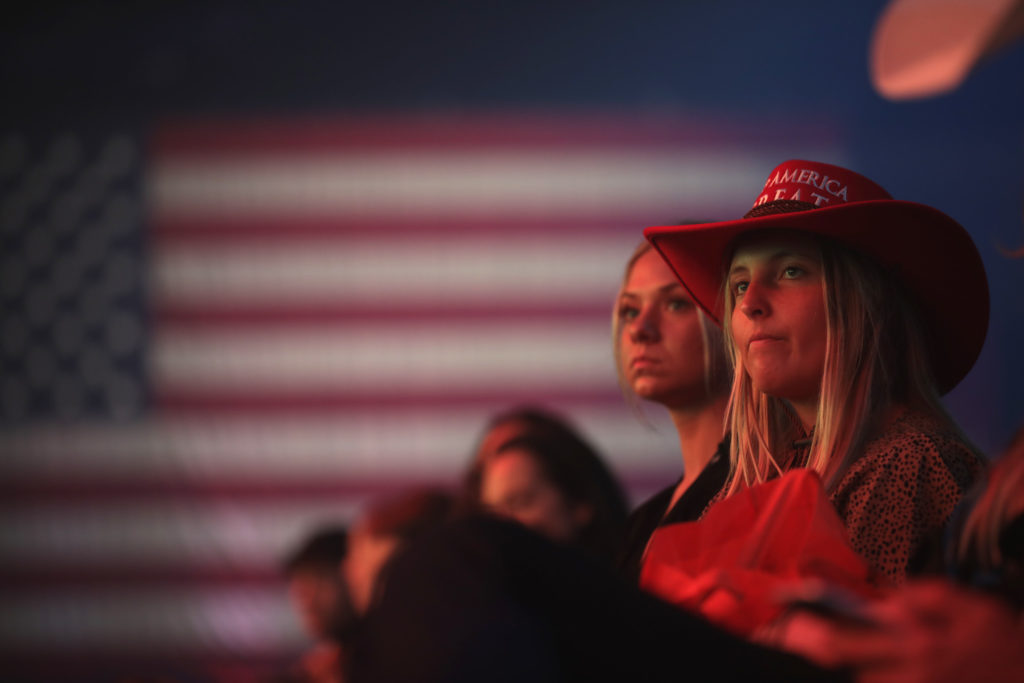
Let me be explicit about the underlying issues in my post about McConnell and Trump: the major political parties in the United States lack central leadership because no one controls the usage of their labels. I have noted this before (indeed, multiple times) but there are no tests of knowledge or ideology, no required boot camp to attend, no audience with the Grand Poobah of the party that one has to endure. To be Republican or Democrat requires only self-declaration. And to be a candidate for office requires winning the party’s primary.
Now, it is true that what I have written above does not apply to third parties (although there are some limited examples of third party primaries). It is also true that there are some limited examples of party conventions being used to name Republican or Democratic candidates at the state level. But in the main, and far and away so, elected officials in the US self-select into their partisan affiliation and win access to the general election ballot via primary elections. They then reap the benefits of those labels in the general, regardless of what party leaders may or may not want. More accurately, perhaps, at that point, all they want is for their co-partisans to win, regardless of anything else (such as whether they are on the fringe or more in the mainstream).
This is an extremely important feature of American politics. It is also unique to the United States in its application. A handful of other parties in other countries have used mechanisms like primaries, but nothing anywhere matches the US in the long-term, nearly universal usage of this mechanism.
Indeed, it is my view that the single most significant (although hardly sole) reason for the stability and durability of our two-party duopoly is the primary system.* It takes away the incentive of factional actors to form new parties. It is easier and cheaper to seek the nomination of one of the two major parties than it is to form a new party.
The Tea Party faction of the GOP is an excellent illustration of this.
A more recent example would be Marjorie Taylor Greene (R-GA14). She is an unabashed supporter of QAnon. Had she tried to form a QAnon Party to run in the 2020 general, she would not have won the seat. The district is overwhelmingly Republican (in 2014 and 2018 the Republican was unopposed and in 2018 he won over 76% of the vote). The winner of the Republican primary is destined by math to win the seat.**
Greene had more money than her competitor in the GOP primary (for an open seat), and won a plurality of 40.6% in the first round of the primary, and went on to win the run-off with 57.1%. She then crushed her Democratic opponent because there are far more Republicans in GA14 than there are Democrats.
The point here is that an entity called “The Republican Party” did not go out and select Greene. Some “they” did not choose to proactively let a QAnon adherent into the party but now here she is.
Now, party leadership in Congress could shun Green, but they have no incentive to do so. At a minimum, the GOP is in a highly competitive environment in Georgia. They have to worry about every vote for Governor and for Senator–and those statewide contests are coming in 2022. How willing would even an idealized GOP House leadership (which, BTW, we do not have) be to risk upsetting Republican voters in GA14? Plus, every R seat is still an R seat and not a dreaded D seat.
So, this is, to deploy a cliche, the tail wagging the dog. Greene is a fringe actor who was able to walk in the open door of the primary process. Now, the national party is in the position of at a minimum passively validating QAnon.
And this is how parties evolve in the United States. In other systems, such fringe actors would either be unable to find a way into the legislature due to lack of electoral support or they would be relegated to being a member of a fringe party (as opposed to being a party a few seats away from being in the majority).
In another system, anyone voting for Greene would have to consciously be voting for the fringe instead of having Greene be part of a far larger mainstream party (in, again, a rigid duopoly, with effectively only two choices). Being the nominee of a mainstream party washes a lot of the fringe off of a candidate for most voters (even if it is only a surface cleaning).
It should be said again: most voters, even informed ones, use party label as the key sorting mechanism when deciding for whom to cast their vote.
Trump himself is the ultimate example of what I am talking about. There is no entrance exam to enter the presidential primaries. There are no party leaders who control access to the party’s label. The label is sitting there for the taking and when Trump won the nomination we won a key leadership position in the party, and that was orders of magnitude more the case when he won the presidency. Just look at how Republicans like Lindsey Graham talked about Trump when he was just a guy in the primary versus when he was the nominee versus when he won.
And his role in the party allows him to communicate with the party mass and that mass listens to leadership (as masses do). And so now we have widespread belief in a number of lies. This power could be leveraged into influence over nominations in 2022. (That and the money that Trump has raised on the backs of those lies).
So, when we look at political calculations for both Trump and McConnell (and, really, numerous GOP actors) it is exactly this: the amount of influence that Trump might have over the coming primary season. The character and tone of the party will be dictated by those chosen by those primaries.
McConnell (and others) know that if Trumpists win primaries in safe GOP districts (or states for the Senate) then those Trumpists will come into power, with all that would mean for the legislative behavior of the party going forward. But they also know that if Trumpists win in competitive states/districts that that could help Democrats.
Further, a third party, even if it only draws small numbers, could very much damage Republican chances in competitive races.
There is a delicate balancing act going on here wherein Republicans like McConnell understand the chaos that Trump could cause in 2022 if his influence with likely primary voters (i.e., “the base”) remains high. But there are also a lot of members of Congress, which includes the roughly 65% of the House caucus who voted to reject the AZ slate of electors, who fear that influence on their own nominations and are acting accordingly.
Never forget: the most fundamental goal of any elected official is to get re-elected (or to move on to higher office). This shapes their behavior more than ideology or public policy (because to further your ideological and policy goals you need to be re-elected). Re-election is a first-order goal.
The main goal of legislative parties is majority control of the chamber and so a fringe co-partisan is better than the sanest member of the opposition. Partisan control of the House, for example, is about the number of people with Rs by their name, regardless of their views or beliefs. As such, Minority Leader McCarthy has every incentive to kowtow to the fringe if he thinks that fringe can win his caucus a few more seats.***
Indeed, one of the main reasons I constantly harp on about representativeness is that we need the electoral rules to better align the motivations of politicians with the actual preferences of voters. This is why a system that effectively gives people only two choices produces a Representative Green when a proportional representation system would likely have produced, at worst, a small QAnon party.**** PR helps corral fringe groups into small parties rather than giving them direct access to large ones, as is the case in the US with open access nomination process and noncompetitive single-seat districts.
Put another way: primaries allow smaller factions of the larger party to capture control of nominations, In turn, those factions often win control of legislative offices because the general election is non-competitive. This then skews the party’s behavior toward the fringe rather than to the broader public. It subverts the very idea of representation. And all of this are key features of our political system.
There are deep, structural reasons for why we are where we are (not that they are the sole reasons).
We need democratic reform badly, but I fear we aren’t going to get it.
*It isn’t simply because of single-seat plurality elections (i.e., Duverger’s Law). Canada, India, and the UK all use that system of election and all three have more than two viable (i.e., seat-winning) third parties. The range and depth of mulitpartism in those cases varies, but one cannot argue that single-seats plurality causes the US duopoly.
To be clear: the primaries are not the sole reason, as presidentialism in general and the EC in particular, help contribute (as do other factors).
**I know that it is possible that some mass-level change of position in a district could take place, but the probability is extremely low (near zero, in fact).
***I would posit that McCarthy’s calculations are different than McConnell’s because of the margins in the two chambers and the fact that Senate races tend to be more comparative than House contests. McConnell just lost control of the Senate because of Trump. McCarthy might be able to leverage Trumpism to win back the House. (This requires more thought, I would note).
****I know it feels like QAnon has taken over the GOP, but the reality is that actually running a QAnon platform would be a radically different thing than being able to drape oneself in the cloak of a mainstream party that has been in continuous operation since the mid-19th century and that is deeply embedded in the identities of tens of millions of Americans.

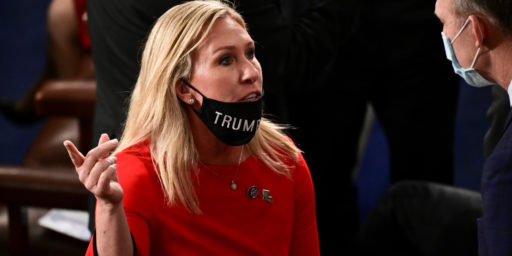
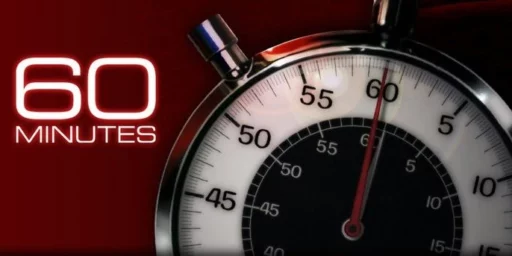

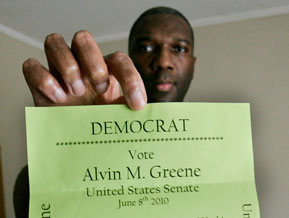
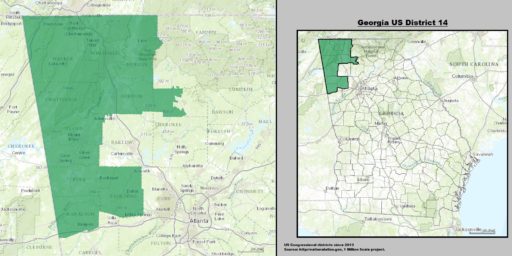
I guess we can blame this on the Libs as the move to selecting candidates via strengthened primaries and weakening party leadership was a result of the McGovern Committee which kicked off the trend toward the current environment and R’s followed along.
But another issue is that Rs have placed themselves in an ideological broom closet through the incessant expulsion of RINOs. Ideologically the party is Susan Collins to Josh Hawley, which when examined is pretty narrow. The Dems are Joe Manchin to Rashida Tlaib. Under any other system it is hard to imagine that pair in the same party.
Absolutely. The incentives are pretty strong even from the standpoint of the voter. I can very much understand the Alabama Republican who personally preferred Doug Jones to Tommy Tuberville, or even Roy Moore, nonetheless deciding that the value of keeping a Republican majority outweighed that preference.
If this is a problem with the primary process itself, how come there are not similarly fringe congressmen in the Democratic caucus? When a Marianne Williamson shows up in a Democratic primary, they get no traction at all.
Qanon has not been successful in the GOP because structural problems in the primaries allow them to wield power far beyond their numbers, but rather because they aren’t actually a fringe group. They’re a mainstream Republican ideology. 56% of Republicans believe Qanon is partly or mostly true:
Majority Of Republicans Believe The QAnon Conspiracy Theory Is Partly Or Mostly True, Survey Finds
With that level of support, someone like Majorie Green would be successful no matter how GOP candidates were chosen.
I believe the Georgia run-off has shown the path for changing the incentives. With Georgia highly competitive, Loeffler and Perdue felt they had to tie themselves to Trump. They went to Green‘s district for their 11th hour rally and it cost them more than it gained them.
Why? I‘d say because the ties to the corruption and falsehood that are Trump and Green were made so undeniably clear that there were enough Republican voters who could no longer ignore those things even for the sake of their party loyalties. (Let‘s call it the Taylor/Joyner effect.)
Now, I grant @James Joyner that this won‘t work in a deep red state like Alabama, but it will work in the more purple and purple trending states. The answer isn‘t to demand reasonable Republicans to shun the Marjorie Taylor Green‘s in their midst. The answer is to wrap the GOP‘s fringe members around the necks of all other Republicans like a heavy chain, so there is no space between them. More losses in statewide office will change the incentive calculus.
I don’t understand why the primary process is a governmental one. Would important problems be created if parties were left to their own devices to decide whom to put on the general election ballot for the party? They could send ballots (or hold caucuses or whatever they wanted) to people registered in their party, or everyone in the state, or whatever mechanism they felt would help them decide who would be most successful in a general election.
@Sleeping Dog:
This is true about presidential elections, but primaries have been used for legislative and other elections for many, many decades (at least since the early 20th century). This has shaped parties far more than presidential nominations (although that clearly matters as well).
@Stormy Dragon: I didn’t say primaries cause fringe candidates. The post is about how primaries shape political behavior. Also: it is undeniable that they create pathways to the ballot for fringe actors and incentivize those fringe actors.
Also: would we have that level of Q acceptance if Trump had not been nominated?
@Stormy Dragon:
Because the GOP is a minority coalition it can not afford defections from its component groups and needs to give in to demands, Dems can be more pragmatic.
Also Reps rely heavily on religious voters whose mindset is uncompromising, again Dems can be more pragmatic. Plus primaries keep driving the party to ratchet to the right by the veto the extreme right holds.
@Steven L. Taylor:
“would we have that level of Q acceptance if Trump had not been nominated?”
Quite possibly. We had a similar, if not greater, level of acceptance of the Tea Party even though McCain was not a Tea Party Republican and he the most recent Republican nominee.
@Stormy Dragon:
If I had to venture a guess, I’d say because the explanation offered in the original article is correct but also incomplete.
The following. I think, is absolutely correct:
Since Goldwater (or perhaps Nixon), the goal of the GOP was to rile up the base with utter nonsense, but not allow the base actual control of the party. They wanted their base angry and committed so that they could get their tax cuts and judges. Unfortunately, the primary process (and lack of central party control) means that the inmates were able to seize the opportunity to become more than just good, loyal foot soldiers. Because of structural factors, they were also able to actually run the asylum. And they increasingly did.
In theory, the Democratic party is just as vulnerable to a takeover by the fringe. That’s just how the primary system works.
But for that to happen, the fringe needs to appear plausible. On the right, the fringe could become plausible because of talk radio and Fox News. There hasn’t been anything equivalent (regarding funding and intra-party acceptance) on the left.
Smaller factions don’t capture the larger party without external backing, for instance in the form of 24/7 propaganda.
In a way, this circles back to previous discussions on whether the GOP is a cult or whether people voted for Trump and assorted QAnon luddites just because of partisanship.
Personally, I would say that while the structural factors that determine voting behavior are roughly similar among GOP and Democratic voters, the specific way in which these structural factors work is qualitatively different.
Partisanship is present on both the left and the right. But it would be strange if the respective qualities of Democratic partisanship (“We want decent government”) and Republican partisanship (“The darkies will not replace us”) would lead to qualitatively similar behavior among partisans.
My strong suspicion is that the discipline of political science privileges quantitative approaches over qualitative ones – or perhaps structural factors over specific ones. I also suspect that is something we see reflected in Steven Taylor’s thinking and writing on these kinds of issues.
Regardless of what structural factors allow in theory, observation demonstrates that Republican and Democratic partisanship is not symmetrical (at all).
@drj:
Plausibility at the very least. Fox News and talk radio have declared the right fringe to the Real America™. Without this veil of respectability for fringe views, there would be no Trump and no QAnon.
@Erik:
Primaries were created by western state governments at a time when eastern business interests routinely bought enough elected officials in the West to control the state legislatures. At the same time those states added initiatives and recalls to their state constitutions, and led the movement for popular election of US Senators. Today, I would be surprised if there are any state parties who would willingly pay for a primary rather than saving that money for the campaign. Elections are expensive.
I blame Obama.
Please check Texas Republican Party rules. I believe their candidates have to sign the party platform. Who wins for the party in a primary almost doesn’t matter, since adherence to the platform is assured.
@AngieDebo: This sounds familiar. I also assure you that it is not binding.
@Stormy Dragon: It occurs to me that AOC is an excellent illustration of my point from the Democratic side of the ledger.
To be clear, I am not equating her to Green in terms of crazy, but she is a clear deviation from the center of the party. Moreover, the bottom line is that she never would have gotten the nomination without primaries–she beat a member of Dem Party leadership and is a self-described Democratic Socialist. In another system she would be in her own party, not having the only route to office be the Democratic nomination.
In terms of crazy, a reader on Twitter noted Kesha Rogers, who won the Dem nomination twice for Congress in Texas (she as a LaRouche devotee who accused Obama of being Hitler).
This is not solely a GOP phenomenon.
Well not since Sheldon Adelson died, anyway.
I don’t altogether accept the main argument. Australia has a system of ‘pre-selection’, where local party members in an electorate interview potential candidates for election and vote to choose the successful one. It has indeed produced some very extreme candidates for both parties. The party organization does have the authority to over-ride the local decision, but rarely does so. When it does, unanticipated consequences can follow.
Back in the last century, the Liberal Party pre-selected a woman named Pauline Hanson to run for the House of Representatives. Shortly before the election, the media revealed that she held some outrageously offensive racist views (this was in the days before social media). The party chiefs dis-endorsed her but it was too late and she was elected anyway. In her maiden speech to parliament, she famously brayed that Australia was “about to be over-run by Asians”.
Hanson went on to found her own party, which to this day has a small but dedicated following from white supremacists. She herself has been in and out of parliament; she currently serves in the Australian Senate. Her party has established a blackly comedic record of endorsing candidates at elections who very occasionally win and leave the party within weeks to serve as independents.
All of which is a long-winded way of saying that even in a parliamentary democracy, parties don’t always get to decide who represents them in elections.
@Steven L. Taylor:
As to your original point (“The post is about how primaries shape political behavior.”), Kesha Rogers is a rather weak example.
Because when she won her nominations, this is how the Democractic Party reacted:
Similarly, Republicans were once willing to stand up against crazy when they condemned David Duke when he won the nomination for a Louisiana House seat. Later, the GOP endorsed Duke’s Democratic opponent in a US Senate race.
You can’t blame Marjorie Taylor Greene just on the primary system. I’m not saying that this explanation is wrong (it clearly isn’t). Rather than wrong, it is insufficient.
@Ken_L:
It would be true that there are varying degrees of ability of parties around the world to control who has access to their labels. That is probably a book-length discussion. For many years, for example, Colombian parties had zero control of their labels (until a reform in 2003).
But the bottom line remains that the gatekeeper in the US is the primary and that no other party system in the world functions this way. And this fact has specific implications for the way parties develop (or don’t) and how they behave.
@drj:
But, of course, I am not blaming Majorie Taylor Greene just on the primary system.
I “blame” (not the word I would use) the primary system for making it exceedingly easy for someone like Greene to access the GOP label, which in her district guaranteed she would win the seat. This then puts the party in the position of having to accept or reject after she is already elected with the commensurate political pressure to accept.
And Kesha Rogers is actually an excellent example of my underlying argument because she was able to use the primary to become the Democratic nominee even though the broader party did not want her. It shows the open access nature of the process and access to a mainline party without the control of said party. It is a perfect illustration of how primaries are central to accessing American parties.
The Dems were also in a position to reject Rogers, because they were going to lose the district anyway. They would have been in a more difficult position had she won.
Same deal: the party itself couldn’t stop Duke from using their label. This is the most fundamental part of my analysis.
Now, you can argue that the GOP should reject Greene, but that is a different issue.
When “Fighting Bob” LaFollette started the primary system in Wisconsin, he couldn’t have imagined what it would turn into.
@Steven L. Taylor:
Of course. Nobody is disputing that.
But that doesn’t take away the party’s power to accept or reject someone as being part of their brand.
The fact that David Duke ran as a Republican doesn’t mean he was one – GOP elites in 1992 ensured that he, in fact, couldn’t credibly claim that label.
While the primary system provides an incentive to look away when a nutjob captures your party’s nomination, it doesn’t explain why this particular incentive trumps the desire to keep the crazies out – there are upsides to that as well!
In fact, in 1992 it was (apparently) more profitable to throw the towel in on your candidate than to let the Nazis in.
That is no longer the case. Still, the primary system has not changed.
As I said before, rather than wrong, your explanation is insufficient.
So what changed? I’d say Rush Limbaugh and Fox News.
This is a really excellent post, well done.
The only thing I would quibble with is how to fix this problem, but that’s ground we’ve discussed many times, so I won’t belabor that argument.
Another example is Bernie Sanders. A Democratic party ostensibly led by Sanders instead of Biden would be a very different party. And if it weren’t for a relative handful of moderate black primary voters, Sanders could easily have been the Presidential nominee.
Like AOC, in a normal multiparty system, they would both be in a Democratic Socialist party.
One could also compare our parties to those in the UK. The Labour party suspended former party leader Jeremy Corbin – something like that happening in the US is simply impossible.